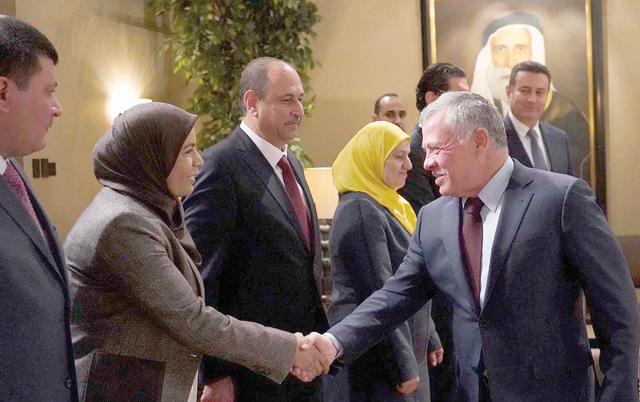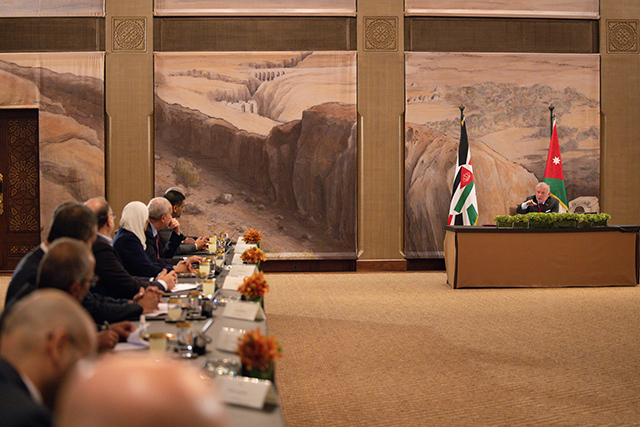You are here
Political parties urged to reach out to public to encourage partisan culture
By Dana Al Emam - Jan 26,2015 - Last updated at Jan 26,2015
AMMAN — Increasing Jordanians’ political participation requires more political parties to develop “convincing programmes” as well as an overall encouraging legislative environment, activists and officials said Monday.
Participants at a discussion on the role of civil society institutions in Jordan’s political development said deepening democracy and forming parliamentary governments highly depends on boosting the public’s engagement in the political arena.
Deputising for Political and Parliamentary Affairs Minister Khaled Kalaldeh, the ministry’s secretary general, Rami Wreikat, said the political reform process requires “wide” public participation.
Wreikat cited His Majesty King Abdullah’s emphasis in his fifth discussion paper on the need for political parties to play an active role as a step towards a gradual adoption of parliamentary governments, under the umbrella of Jordan’s constitutional Monarchy.
He said political parties (there are around 34 registered parties), bear the responsibility of merging to form a “reasonable” number of large parties, urging them to adopt “comprehensive” programmes that encourage public participation.”
Last year, the ministry organised an event at the University of Jordan in which political parties presented their programmes to students,” Wreikat said, adding that the event sought to counter the belief that political activity is forbidden among students.
The ministry seeks to “widen the circle of national dialogue” and enhance political participation, mainly targeting women and the younger generation, he noted at the discussion, organised by the Konrad-Adenauer-Stiftung.
Meanwhile, Saleh Rsheidat, secretary general of the National Current Party, said political parties will remain “marginalised” unless the Elections Law entails the formation of proportional lists on a political party base.
He cited the public’s “disinterest” in joining political parties as another problem, urging media outlets to shift gears towards encouraging Jordanians to join political parties.
However, Bariah Naqshabandi, an activist and political science professor at Petra University, disagreed with Rsheidat, highlighting a “weakness in earning the people’s trust” in most political parties.
“The lack of trust is due to the belief that one’s voice in not heard, and if heard is not effective,” she said, adding that young people build their knowledge of political parties on the experience of the older generation.
Naqshabandi noted that the popularity of Islamist parties is due to the fact that some of them were registered as associations, not political parties, which means that they were allowed to organise charity campaigns when political party activity was forbidden.
Commenting on the significance of an encouraging legislative environment, advocate Rehab Qaddoumi said legislators must reconsider laws governing political participation.
Qaddoumi cited Article 6 of the 2012 Political Parties Law, which stipulates that women constitute no less than 10 per cent of party members and members from governorates form no less than 5 per cent.
“However, the new draft political parties law removes this condition, which used to encourage wider public participation and enrolment in political parties,” she said.
Qaddoumi, who is also the deputy secretary general of the Jordanian United Front Party, said penalties on external funding in the draft law should be moved to the Penal Code, a suggestion that Wreikat agreed with.
Speaking from personal experience in parliamentary elections, former senator Samar Haj Hassan said she realised the importance of belonging to a group or a political party while running for parliamentary elections.
“But the problem was that none of the existing parties were suitable for me,” she said.
Young people, Haj Hassan added, develop a “thirst” for political participation when they find a suitable representative, highlighting the role of political parties in reaching out to the public.
Related Articles
AMMAN — His Majesty King Abdullah on Wednesday called for engaging young people in charting the nation’s future and enhancing their politica
AMMAN — His Majesty King Abdullah on Tuesday reaffirmed Jordan’s commitment to political and media pluralism, adding that the Kingdom was ne
AMMAN – The Royal Committee to Modernise the Political System (RCMPS) members on Sunday said the recommendations, which included two new dra


















